What Should You Expect on a Kibale Forest Chimp Trek?
Living within the gorgeous rainforest of Kibale National Park are humanity’s genetic ancestors: the chimpanzees, one of the world’s most iconic and endangered primates. You can encounter these intelligent primates in person during a Uganda safari. It’s truly one of nature’s rarest, most emotionally-charged experiences, (and it costs a fraction of visiting our larger cousins). Here’s what to expect on a Kibale Forest Chimp Trek.
Content
The chimpanzees of Kibale Forest
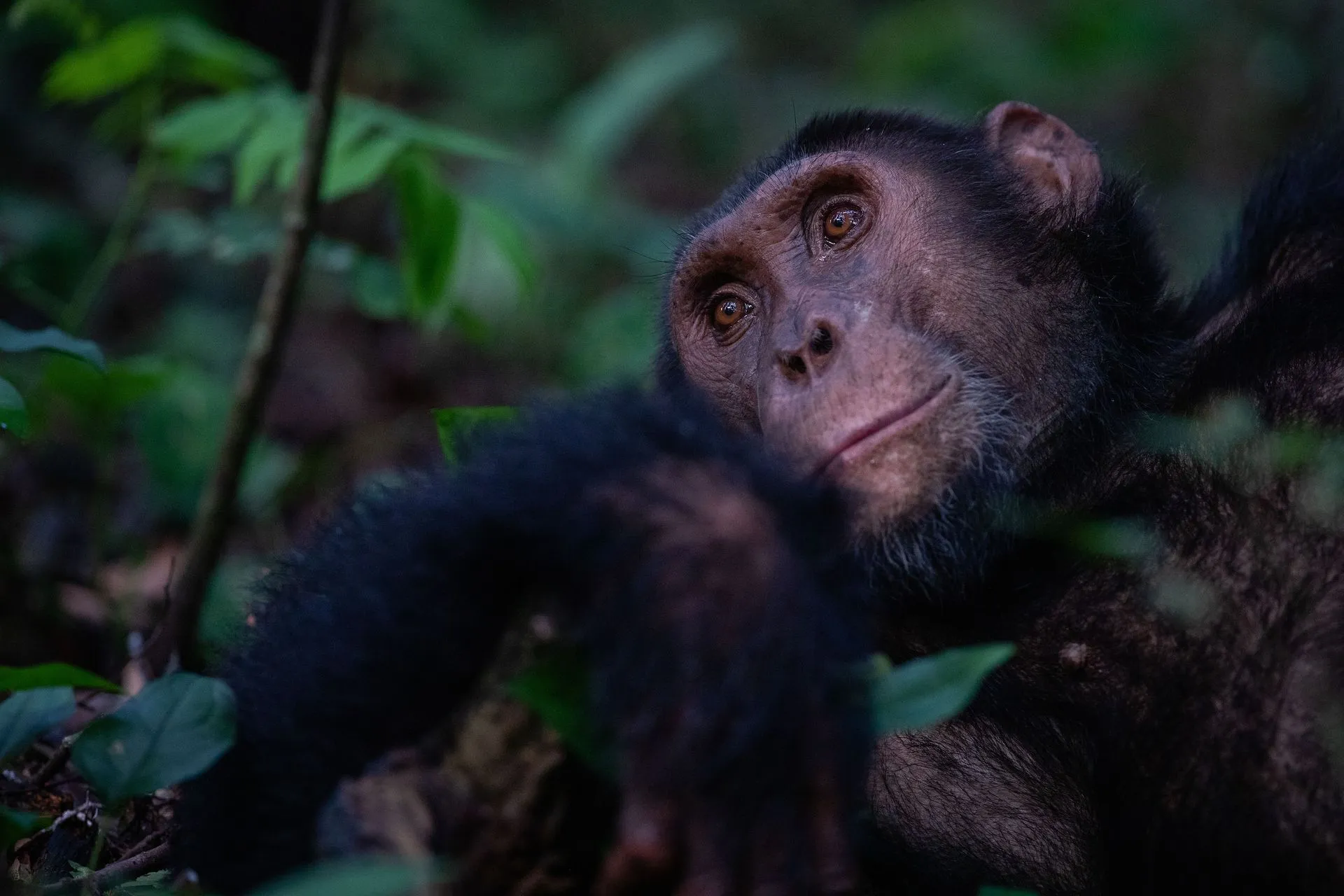
It’s estimated that around 300,000 chimpanzees remain in the wild today, a significant decline from over one million in the early 1900s!
Major threats to chimps’ survival include habitat destruction, hunting for bush meat, and the illegal exotic pet trade.
Uganda’s Kibale Forest is one small hope that we, as a dominant species, are capable of compassion and can think of the well-being of our fellow creatures beyond the narrow confines of our self-interest.
Kibale is home to around 1,500 wild chimpanzees, spread across 13 communities.
Some of these groups have been successfully habituated for scientific research, while others, like the Kanyanchu group, are used for chimpanzee tracking.
The Kanyanchu group consists of over 120 individuals.
Tracking excursions are available in the mornings and afternoons, lasting between 3 to 5 hours, with up to one hour spent observing the chimps.
The cost of a tracking permit is US$250 per person, a fraction of the US$800 and US$1500 price tags for gorilla trekking permits at Uganda’s Bwindi Forest and Rwanda’s Volcanoes National Park respectively.
If an hour isn’t enough for you, the park offers a habituation experience, where you can spend an entire day (US$300) following one of the two chimpanzee communities currently undergoing the two-year habituation process.
Be ready for some brisk walking, as chimpanzees move quickly, but the effort will be well worth it for a more personal and rewarding encounter.
What to expect from your chimp trek?
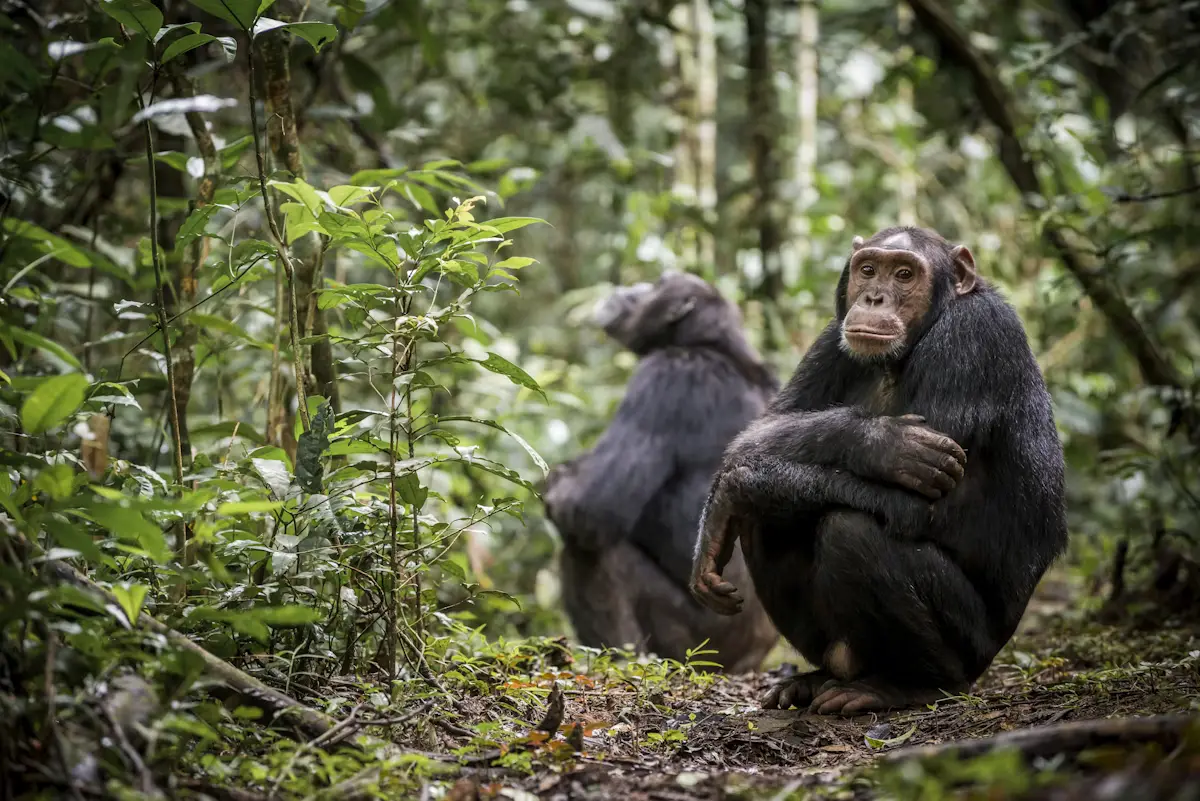
Most visitors choose a morning chimpanzee trekking session, typically starting at 8:00 am, which gives you ample time to locate the group and spend an exciting hour with them.
The experience begins with a briefing, where you’ll learn about the primates you’re about to encounter, along with important guidelines.
One key rule: keep a safe distance. This is essential not only for your safety but also for theirs, as our colds, viruses, and diseases can easily be transmitted to them due to our shared DNA.
It is also not wise to mimic their calls. While it may seem fun to imitate them, if you are not careful you might unintentionally trigger a battle cry and bring a group of 120 angry chimpanzees down upon you.
After the briefing, you will be divided into groups of up to seven, each with a guide, who is armed in case of emergencies. Then, the adventure into the forest begins.
Pushing through the tangled undergrowth, ducking under low-hanging branches and watching out for tangled roots, you’ll head towards the area where the chimpanzees were last spotted, all while keeping an ear out for their calls overhead.
With some luck, you’ll soon hear them pant-hooting – a truly evocative sound, signaling that you’re about to come face-to-face with chimpanzees.
As you move towards the source of the noise, you’ll likely encounter one of the family’s sub-groups. They could be high in the trees, feasting on figs, grooming each other, or playing.
However, if you’re fortunate, some may come down to the ground, and that’s when the true magic unfolds.
Face to face with wild chimpanzees
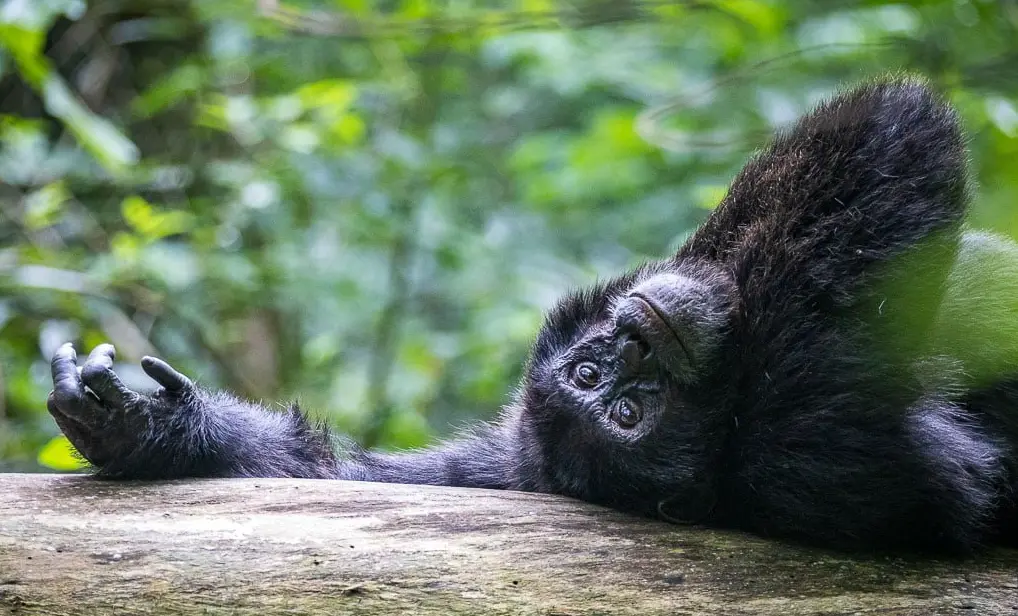
No matter how prepared you feel, nothing compares to that first, close-up encounter with a wild chimpanzee.
The surge of adrenaline as you stands just a few feet away from these fully wild creatures.
The thrill of seeing their intelligence through their postures, expressions, and interactions that seem almost human.
The way they lock eyes with you, even striking a pose for your camera, might make you wonder if they’re enjoying the moment even more than you are.
While gorillas are Uganda’s star attraction, encountering a wild chimpanzee is just as exhilarating.
In fact, it might even be more rewarding, as the terrain is easier to navigate, the forest is less dense, the chimpanzees are simpler to locate, and the cost is much more affordable.
These are all great reasons to consider placing the Kibale Forest chimp trek a top priority on your list of things to do in Uganda.
Are sightings guaranteed?
No, chimpanzee sightings are not guaranteed in Kibale Forest.
However, the likelihood of spotting chimps during any given trek is about 95%, which is significantly higher than in other chimpanzee trekking destinations worldwide.
The main reason sightings aren’t as certain as with gorilla trekking is that chimpanzees are much more mobile.
To increase your chances of seeing them on your Uganda wildlife adventure, you might consider booking two treks—one in the morning and another in the afternoon, or visiting two different chimpanzee trekking sites in Uganda.
How difficult is Chimpanzee Trekking?
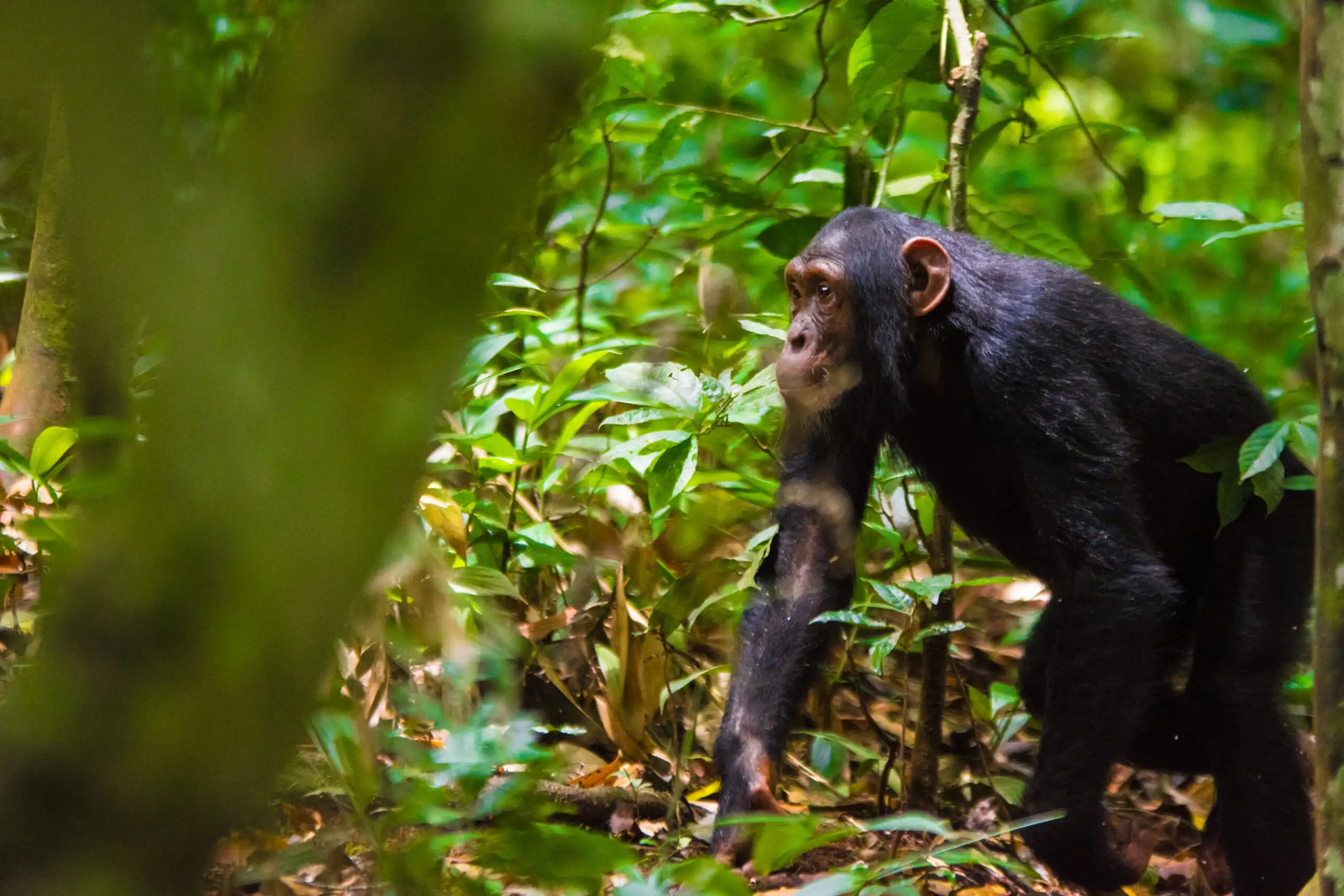
Typically, the Kibale Forest chimp trek lasts up to three hours.
You’ll begin by searching for the chimps, and then follow them, so it’s important to be fit enough to stay on your feet for the duration.
If you’re not quite prepared, light training before your trip would be helpful.
Fortunately, Kibale is relatively flat, and most of the trek is on clear trails.
Some treks may be less physically demanding, depending on how quickly the chimps are located.
However, the fitter and more agile you are, the easier it will be to keep up, especially if you have to chase the chimps through thick undergrowth.
What other wildlife might I see?
While chimpanzee trekking mainly focuses on finding and observing the chimps, Kibale Forest is also home to a wide variety of other wildlife.
The park is one of the most biodiverse rainforests in East Africa, sheltering over 60 mammal species, 12 types of monkeys, and more than 375 recorded bird species.
Commonly spotted monkeys in Kibale include the red colobus, black-and-white colobus, red-tailed monkey, L’Hoest’s monkey, and the Uganda mangabey, which is endemic to Uganda.
Key bird species in the park include the Green-breasted pitta, African pitta, great blue turaco, double-toothed barbet, Dusky Crimsonwing, blue-breasted kingfisher, and red-bellied paradise flycatcher.
To experience a wider variety of the forest’s birds and monkeys, consider taking a guided nature walk in the Bigodi Wetland Sanctuary, a community-based ecotourism project located at the edge of the park.
Is a chimpanzee trekking safe?
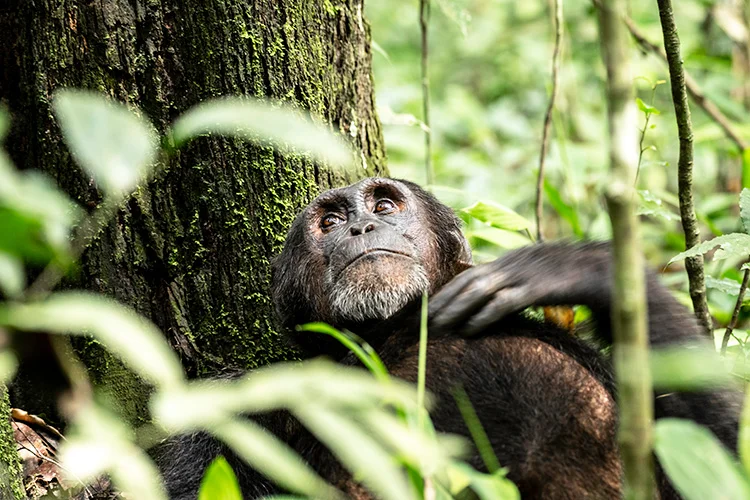
Chimpanzee tracking in Kibale Forest National Park is generally considered safe, and there have been no reports of guests being harmed by a chimpanzee.
However, it’s important to remember that a large chimp is about the same size as an adult human and is much stronger, so it’s crucial to follow your guide’s instructions for your safety.
Children under 12 are not allowed on chimpanzee treks, as they are smaller and more vulnerable.
For both safety and comfort, it’s recommended to wear sturdy hiking shoes, long pants, and a long-sleeved shirt.
Tucking your pants into your socks can help reduce the risk of bites from safari ants. These insects are harmless. However, they quite common and have a nasty bite.
It’s also advisable to wear neutral-colored clothing that blends into the surroundings. Khaki, green, and gray are ideal choices.
A walking stick might be useful for navigating through tricky areas.
How much is a chimpanzee trekking tour Package?
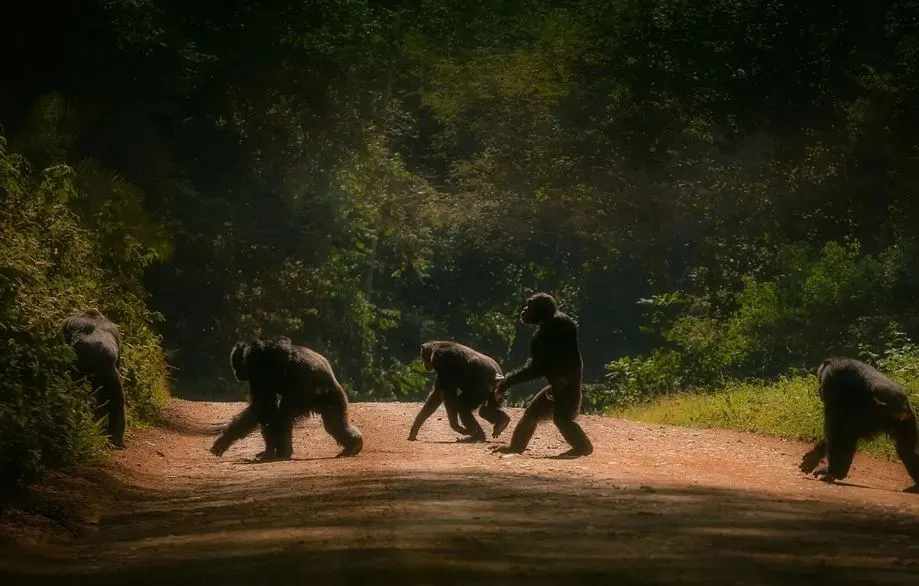
The basic cost for a Kibale Forest chimp trek is US$250 for foreign non-residents, US$200 for foreign residents with a work permit, and UGX 180,000 for East African citizens.
These fees, set by the Uganda Wildlife Authority, cover both the park entrance fee and the services of a guide.
If you travel independently to the trekking trailhead at Kanyanchu, this is the total amount you’ll need to pay.
For those looking for more comprehensive packages, 3- or 4-day chimpanzee trekking tours from Kampala or Entebbe typically range from US$850 to US$2,000 per person sharing, depending on the quality of accommodation.
Many visitors to Kibale National Park combine it with visits to other parks in western Uganda, such as Bwindi Impenetrable, Queen Elizabeth, and Murchison Falls National Parks.
Depending on the safari package, duration, and type of accommodation, these tours usually cost upwards of US$250 per person per day sharing.
The Lodges
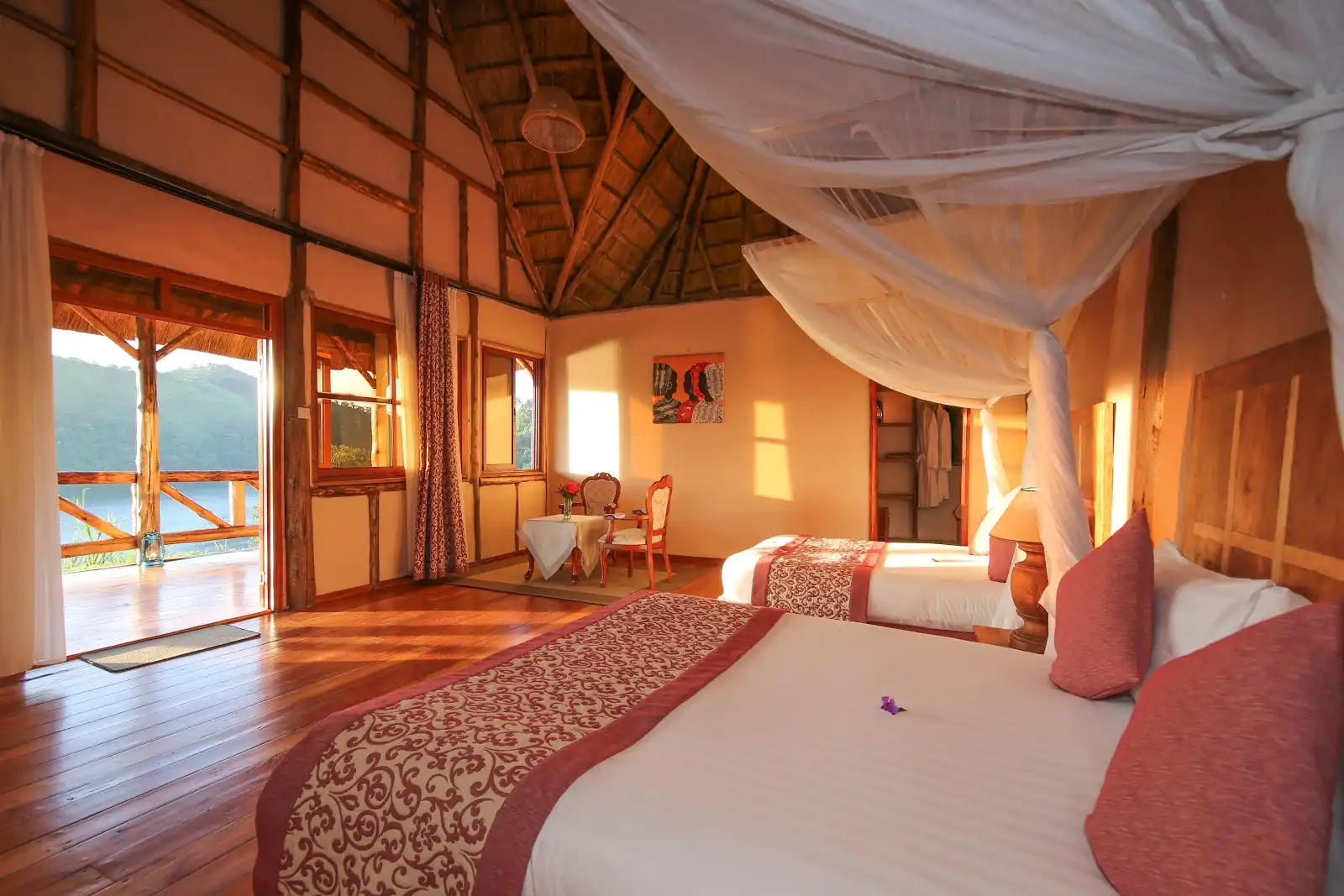
There is a wide variety of accommodation options near Kibale National Park to fit all budgets.
The most luxurious choices are private cottages, complete with electricity, Wi-Fi, and all modern amenities.
For a more immersive experience, tented camps offer a closer connection to nature.
If you’re planning a chimpanzee trek in Kibale, make sure to consider the distance to Kanyanchu, where the trek begins.
Best Available Lodges include;
- Crater Safari Lodge – Luxury
- Kibale Forest Camp –Midrange/budget
- Chimpanzee Forest Lodge – Midrange/budget
- Primate Lodge – Luxury
- Mountains of the Moon Hotel – Midrange
- Kyaninga Lodge – Luxury
- Ndali Lodge – Luxury
- Isunga Lodge – Midrange
Planning Details
Kibale Forest National Park is located approximately 326 kilometers (about a 5-hour drive) from Kampala, Uganda’s capital.
It’s not accessible by direct road travel, so visitors can fly via chartered or scheduled flights to the nearby Kasese airstrip, followed by a 2-hour drive to the park.
Due to the logistics involved and the limited availability of trekking permits, it’s important to plan a Kibale chimpanzee trekking tour with a few days’ notice.
However, it can easily be incorporated into almost any Uganda safari tour.
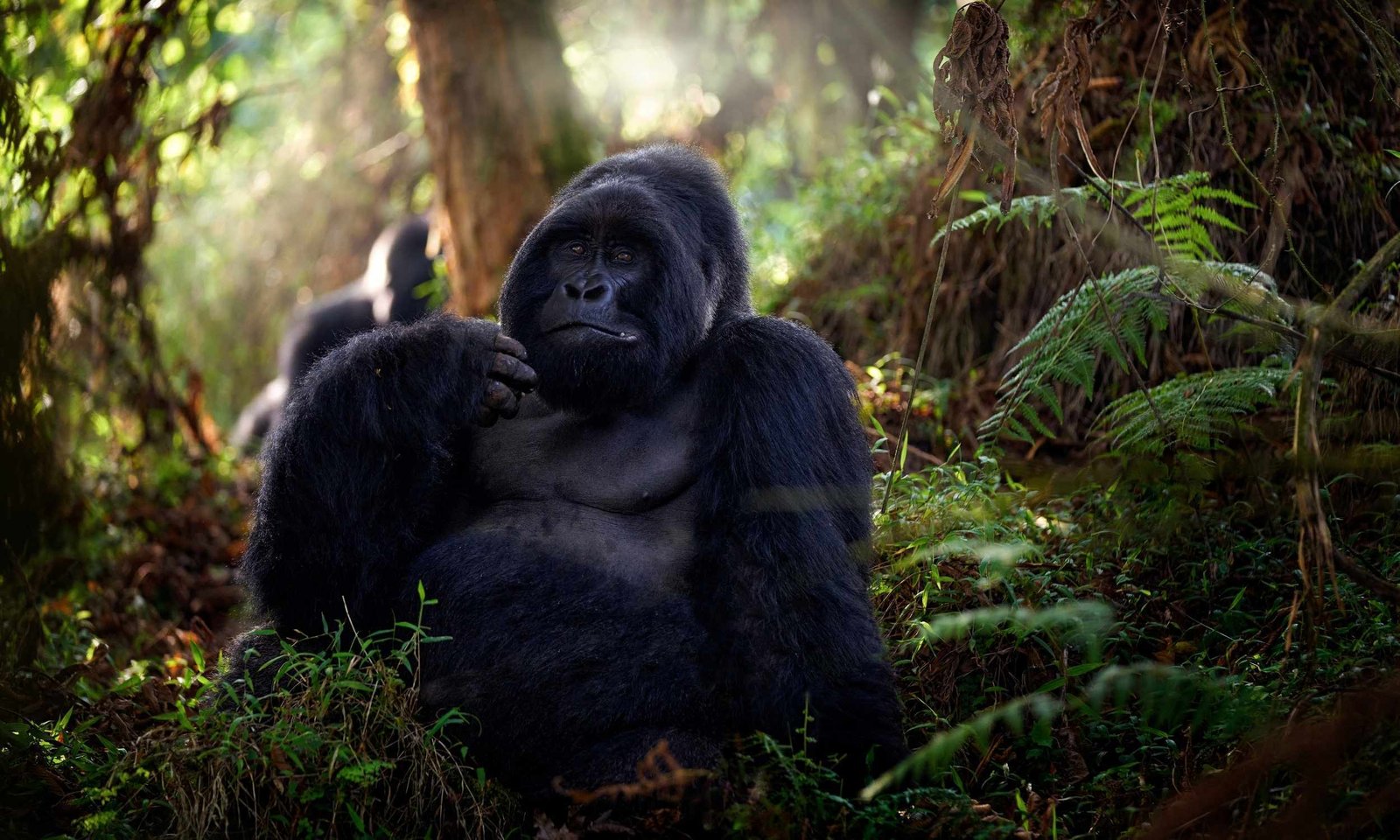
Talk To a friendly team
Africa Safaris
Safaris By Type
Top Safari Parks
Help & Info
- About us
- Travel Blog
- Travel FAQS
- Gorilla Permits Bookings
- Contact Us
- Pay Online
